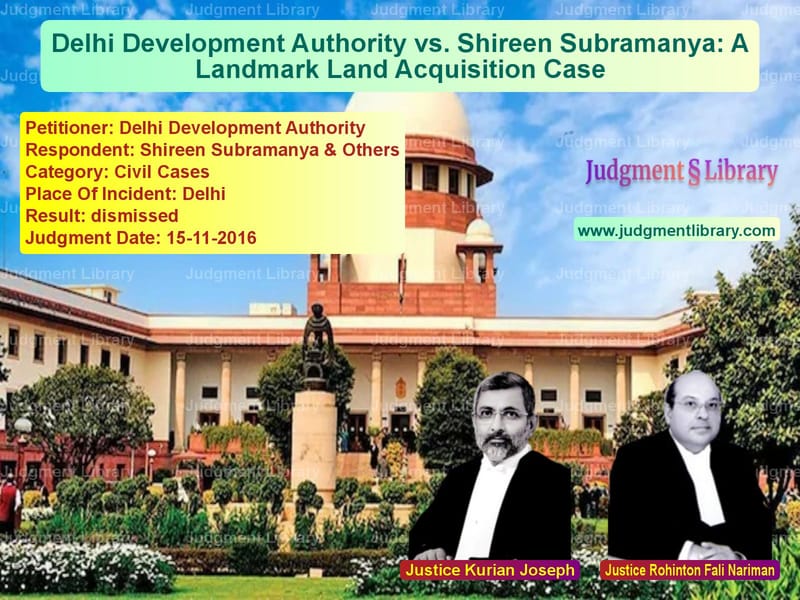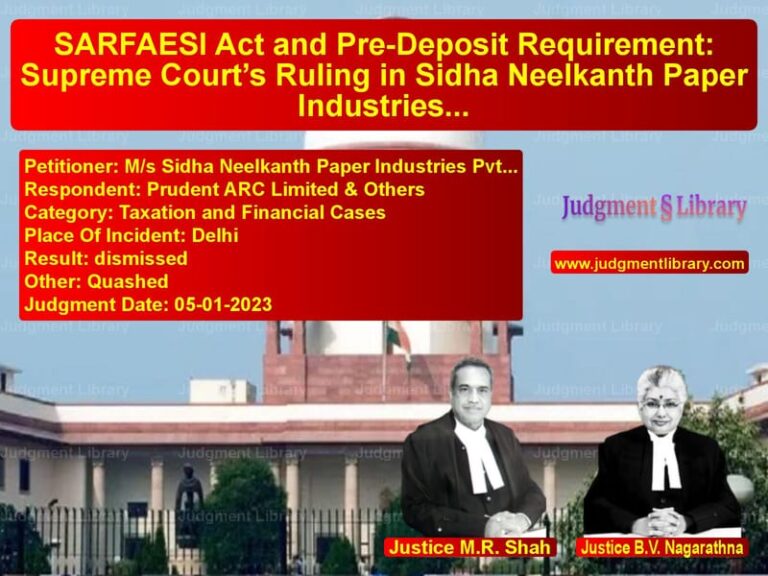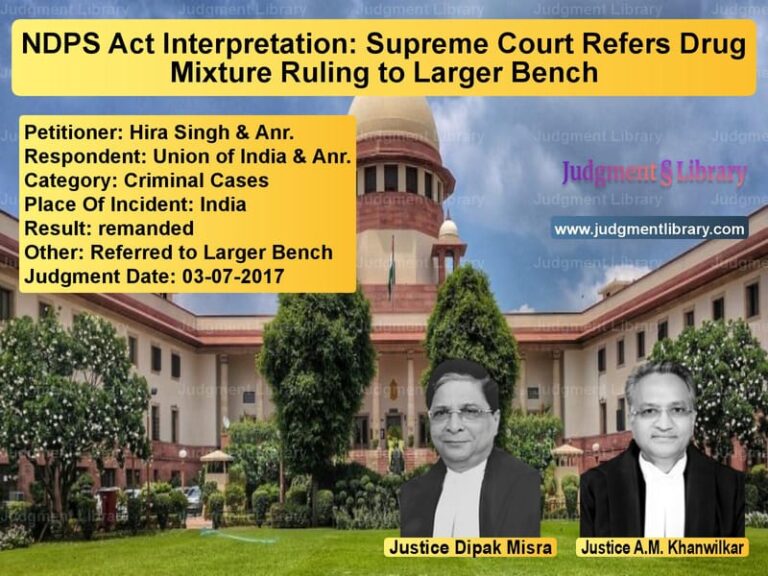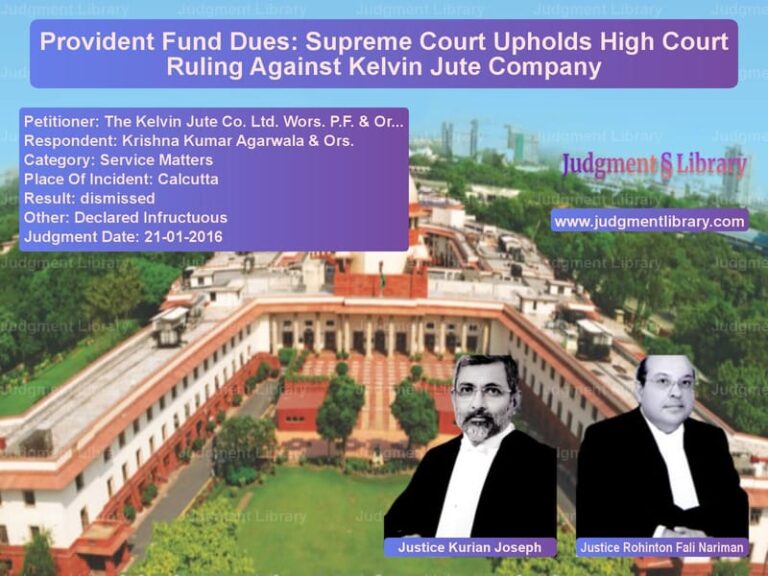Delhi Development Authority vs. Shireen Subramanya: A Landmark Land Acquisition Case
Land acquisition cases in India have always been a subject of intense legal scrutiny and public debate. The case of Delhi Development Authority (DDA) vs. Shireen Subramanya & Others stands out as a crucial judgment in the interpretation and application of the Right to Fair Compensation and Transparency in Land Acquisition, Rehabilitation, and Resettlement Act, 2013 (commonly known as the 2013 Act). The Supreme Court’s ruling in this case reaffirmed legal principles surrounding landowners’ rights, government acquisition procedures, and fair compensation mechanisms.
Background of the Case
The Delhi Development Authority (DDA), an urban planning authority under the Government of India, was responsible for acquiring land for developmental projects in Delhi. The respondents, including Shireen Subramanya, challenged the acquisition of their land, arguing that the process did not adhere to the provisions of the 2013 Act. This case was significant because it tested the validity of land acquisitions initiated before the enforcement of the 2013 Act but not completed according to its provisions.
Legal Context: Section 24(2) of the 2013 Act
One of the key legal questions in this case revolved around Section 24(2) of the 2013 Act. This section states that if land acquisition proceedings were initiated under the old Land Acquisition Act, 1894 but compensation had not been paid, or possession had not been taken, then the acquisition would be deemed to have lapsed. The respondents argued that since they had neither received compensation nor had possession been taken, the acquisition was legally void.
Arguments by the Petitioner (Delhi Development Authority)
The DDA presented the following arguments:
- The acquisition process was conducted in accordance with the laws that existed at the time.
- Compensation had been deposited in a government account, which they claimed was sufficient compliance.
- The land was required for public development, and any decision to overturn the acquisition would disrupt planning initiatives.
- The judgment in previous cases should not be applied in a blanket manner to all land acquisition matters.
The DDA urged the court to recognize its authority in planning and development, emphasizing that the government’s need for land should not be obstructed by legal technicalities.
Arguments by the Respondents (Shireen Subramanya & Others)
The respondents countered the DDA’s claims with the following arguments:
- No compensation was ever received by the landowners, which meant the acquisition process was incomplete.
- The government’s mere deposit of compensation in an account did not amount to actual payment as per the Supreme Court’s interpretation in earlier cases.
- As per Section 24(2) of the 2013 Act, if compensation was unpaid and possession was not taken, the acquisition process must be considered void.
- Landowners had a fundamental right to either receive just compensation or reclaim their property.
The respondents relied on precedents set in Civil Appeal No. 8477 of 2016 and Civil Appeal No. 5811 of 2015, which established that merely depositing compensation in government accounts did not fulfill the legal requirement of ‘payment.’
Supreme Court’s Reasoning and Judgment
The Supreme Court, in its ruling delivered by Justice Kurian Joseph and Justice Rohinton Fali Nariman, upheld the respondents’ claim. The key observations made by the court were:
- The principles set in previous cases (Civil Appeal No. 8477 of 2016 and Civil Appeal No. 5811 of 2015) applied to the present case.
- The mere deposit of compensation did not amount to actual payment.
- The acquisition must be deemed to have lapsed under Section 24(2) of the 2013 Act.
- The DDA was granted a one-year window to initiate fresh acquisition proceedings.
The judgment made it clear that the government must follow due process when acquiring land and that landowners’ rights must be respected.
Key Takeaways and Legal Implications
This judgment has far-reaching implications for land acquisition cases in India. Some of the critical takeaways include:
- Government authorities cannot merely deposit compensation; they must ensure actual payment to landowners.
- If acquisition proceedings remain incomplete under the 2013 Act, they will lapse, and landowners can reclaim their property.
- The ruling reinforces judicial scrutiny over administrative actions concerning land acquisition.
What Happens Next?
The DDA was given one year from the date of the judgment to initiate fresh acquisition proceedings under the 2013 Act. If it fails to do so, the land must be returned to the original owners.
Conclusion
The Supreme Court’s judgment in Delhi Development Authority vs. Shireen Subramanya & Others highlights the importance of following due process in land acquisition matters. By reinforcing the provisions of the 2013 Act, the ruling ensures that landowners’ rights are protected and that authorities cannot arbitrarily acquire land without fulfilling legal obligations.
As land acquisition continues to be a contentious issue in India, this judgment serves as a crucial precedent, ensuring fairness and transparency in government dealings with private property.
Don’t miss out on the full details! Download the complete judgment in PDF format below and gain valuable insights instantly!
Download Judgment: Delhi Development Au vs Shireen Subramanya & Supreme Court of India Judgment Dated 15-11-2016.pdf
Direct Downlaod Judgment: Direct downlaod this Judgment
See all petitions in Property Disputes
See all petitions in Landlord-Tenant Disputes
See all petitions in Damages and Compensation
See all petitions in Judgment by Kurian Joseph
See all petitions in Judgment by Rohinton Fali Nariman
See all petitions in dismissed
See all petitions in supreme court of India judgments November 2016
See all petitions in 2016 judgments
See all posts in Civil Cases Category
See all allowed petitions in Civil Cases Category
See all Dismissed petitions in Civil Cases Category
See all partially allowed petitions in Civil Cases Category







